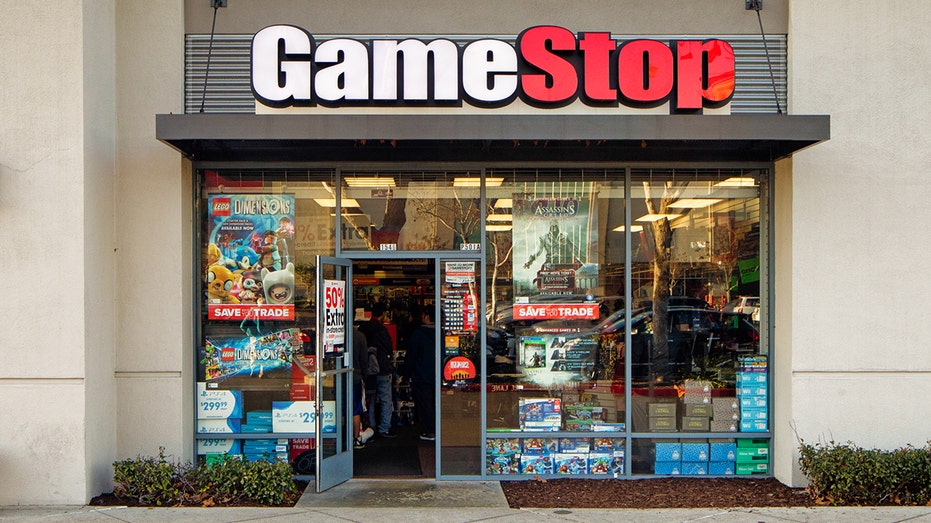Some GameStop investors got in with one goal — to pay off debt
Now with the stock price dipping, the focus turns to when to sell
Some investors took a flier on GameStop Corp. stock in hopes they would make enough money to pay down debt. Now, after a wild January featuring a 1,625% rise, comes the hard part: deciding when to sell.
With the hot stock dipping on Thursday, the question has become more urgent.
Den Kovacs, a 25-year-old IT professional living in Detroit, moved $1,000 from his emergency savings and $200 he'd set aside for his student loan payment into his Robinhood account -- all with an eye to getting a slice of the GameStop mania. On Jan. 25, he sold his other stocks to buy four shares of GameStop at $80. After selling four shares for $212 on Jan. 26, he bought six more shares at $292, according to trade receipts provided.
His end goal: make enough money to pay down his $7,000 credit card debt.
| Ticker | Security | Last | Change | Change % |
|---|---|---|---|---|
| GME | GAMESTOP CORP. | 23.91 | +0.01 | +0.06% |
PROVING GAMESTOP MANIPULATION WILL BE TOUGH FOR SEC, OTHERS
Mr. Kovacs and many other individual investors have been following the frenzy on Reddit, Discord and other platforms. On Friday, Mr. Kovacs sold his remaining seven shares at $352 and said he plans to use the gains -- nearly $2,500, according to trade receipts provided -- to pay down part of his credit card debt.
"I want to put myself in a position where I'm not sitting in debt like that," he said. "It's hurting my credit score, and I want to be able to move somewhere else. So I want to pay down debt with whatever I've gained from this."
As a forum, WallStreetBets typically derides those who sell because many want to leverage group power to continue the rally. But when it comes to paying down debt and reaching other savings goals, some users changed their tune.
One Redditor posted a screenshot from what he said was his final student loan payment: $23,504.45 made from GameStop trades.
"Never thought I would have paid this off so soon," the user posted.

Some investors took a flier on GameStop Corp. stock in hopes they would make enough money to pay down debt. (AP Photo/John Minchillo)
For some traders who plan to use their windfalls to eliminate their student debt and pay down other obligations, it seems worth the gamble.
Amina Spahic, a 28-year-old communications specialist in Florida, originally bought two weeks ago for $38 a share. She has already used some of her GameStop gains to pay down debt and put the rest back in GameStop. Having already made her moves earlier this week, she said she has no plans to sell for now.
"I knew there was growth and potential," she said. "I told everyone I knew, 'I am seeing this on Reddit. Do this.'"
ROBINHOOD EXPANDS TRADING RESTRICTIONS TO 50 STOCKS
Millennials' average credit card debt edged up to $4,322 in the third quarter of 2020, according to analysis by Experian. More than 22 million borrowers with direct federal student loans paused payments during the pandemic, according to data analyzed by Mark Kantrowitz, author of "How to Appeal for More College Financial Aid."
Some traders have started to envision the earnings for money milestones that remain out of reach.
Anthony Eleftheriou, an 18-year-old university student living with his parents in London, only first began investing a month ago. He bought 25 shares of GameStop at $50 on Jan. 22, and he said he is planning to hold for now, perhaps even using his gains to pay tuition fees.
"I was kind of wanting a quick rich thing but now it's turned into more of a long-term thing," he said.

Now, after a wild January featuring a 1,625% rise, comes the hard part for GameStop investors: deciding when to sell. (iStock)
Joe Ballent, a 32-year-old physician assistant working in Cheyenne, Wyo., said he's giving priority to some other goals before his student loan debt with his GameStop earnings: First, paying for his coming wedding, and next, saving up to buy a house. Both seemed out of reach before the GameStop rally, he said.
"I feel like there's a lot of people who have never been able to get ahead. I took on six figures of debt [for graduate school] and worked two jobs before school, but now I can't afford a house?"
Mr. Ballent began putting more money into the market last year, first with RobinHood and then with accounts at Vanguard and Schwab. Now, he has more than $10,000 invested in GameStop, according to trade receipts provided. He is slowly selling shares, using some of his gains to pay for the wedding and help with a loved one's medical expenses. Once he sells off entirely, he wants to start his housing hunt.
"I'm sure I'm just a small fish compared to some of these folks," he said. "But it's significant for me, and I still want to see where it goes."
GET FOX BUSINESS ON THE GO BY CLICKING HERE
Following RobinHood's decision to join other brokerages in restricting trades on rapidly rising stocks, Miss Spahic said she is planning to eventually close out her positions and delete the app. She is still following the conversation on Reddit to determine what brokerage she will choose as a replacement.
"I'm following closely what each of them are saying," she said. "I'm waiting to see who comes out on top and says they're for the people."
Meanwhile, Mr. Kovacs and others are keeping their eyes glued to WallStreetBets.
"I think people recognize there's an opportunity here," he said. "You see these gains and watch what happened earlier this week and you go, 'Is everyone collectively right or is everyone collectively wrong?' Just like me."
Marco Quiroz-Gutierrez contributed to this article.




















